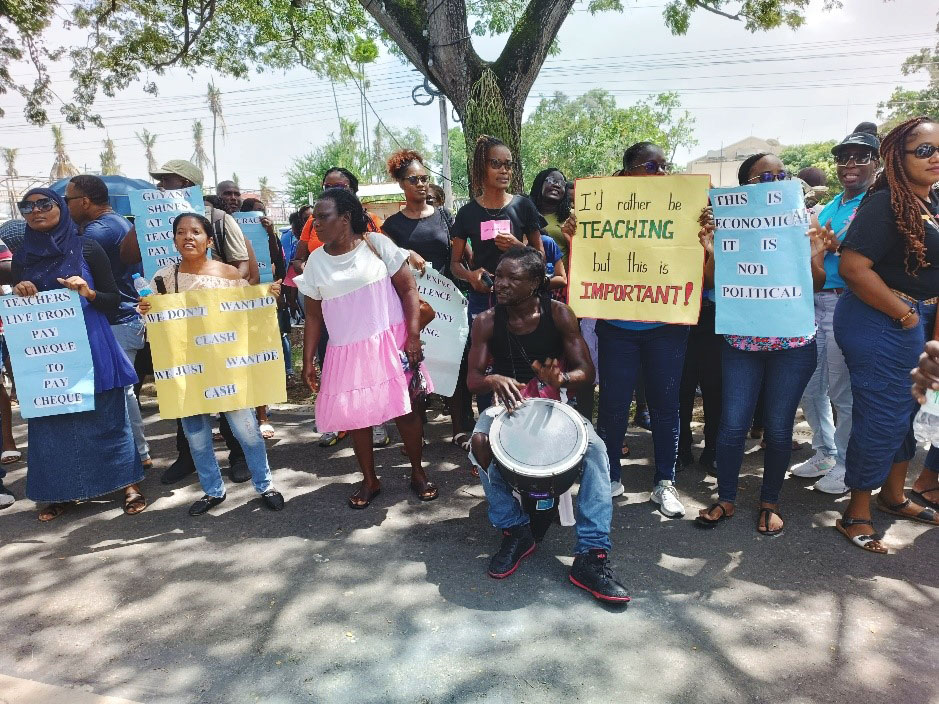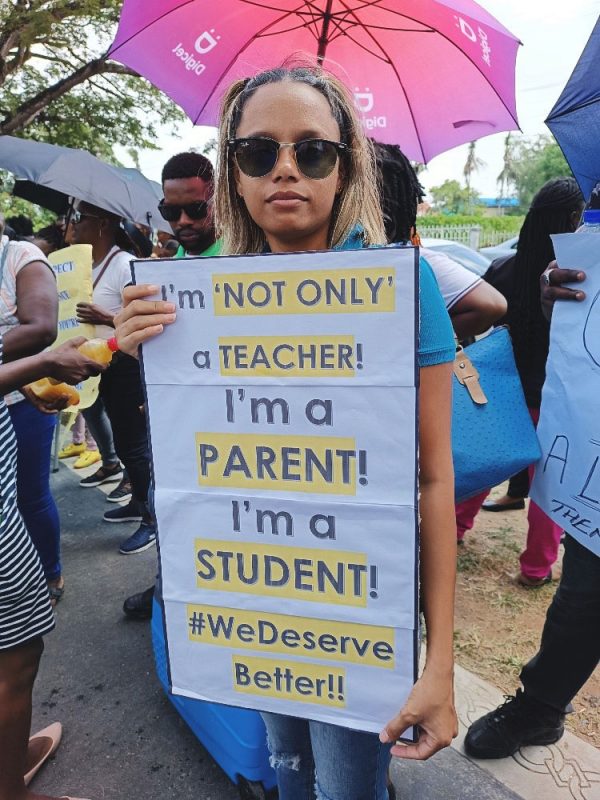By Abigail Headley
The GTU yesterday said it was mobilizing strike relief for use when necessary and it vowed to proceed with legal action against the government over planned deductions from salaries.
Meanwhile, senior members of the Guyana Teachers’ Union (GTU) yesterday met with the Guyana Trades Union Congress (GTUC) and other unions to discuss the ongoing strike action by educators.
The meeting focused on updating union affiliates on the strike action and garnering support from other trade union bodies.
President of the GTU Mark Lyte confirmed to members of the media that the initial 10-day strike is still on and will continue indefinitely until teachers’ demands are met. He also addressed the government’s decision to deduct money from teachers’ salaries during the strike, reaffirming that legal action will be taken to challenge this move.
Regarding strike relief for teachers, Lyte stated that the union is working on a plan to support members who have been out on strike. The union, he said, is currently gathering data on which teachers have participated in the strike to determine the extent of support needed.
As for the number of teachers participating in the strike, Lyte estimated that around 6,000 teachers, almost half of the teaching population, could potentially lose pay due to the government’s actions. He noted that despite fluctuations in numbers, the union is strategizing to ensure a presence on the picket line daily.
The outcome of the meeting yesterday saw the GTU emerging with confirmed backing from the GTUC as well as the Guyana Public Service Union (GPSU). After the small closed-door gathering, GTUC General Secre-tary Lincoln Lewis emphasized to reporters the importance of unity among various unions, highlighting the support from organizations such as PSU in standing behind the GTU. He noted the need for a strong stance against the government’s attempts to undermine the rights of teachers and further emphasized that this issue transcends individual unions and is a matter of collective bargaining.
While pointing out that the recent decision by the government impacts trade union recognition laws, Lewis expressed determination (on behalf of his union and others alike) to protect the rights and privileges of union members. He also emphasized the need for accountability and fair negotiations in determining benefits and working conditions.
While the union members convened at the Critchlow Labour College, teachers across the nation again took to the streets for their seventh day of protest. Some from the Georgetown contingent took time out from the collective chanting to speak with Stabroek News.
Junior teachers
Jenel Richards express-ed concerns about the government’s allocation of funds towards experienced teachers, leaving junior teachers feeling neglected. She emphasized the importance of the government addressing the demands of teachers to show their commitment to both educators and students.
“By the time my salary is paid, my mortgage is paid and that is it and for the rest of the month I have to be scrambling for transportation money and all of that. [Then] there are junior teachers who are getting way less than I am getting, and [who] have children and all these things, how are they supposed to survive on this money? And then when we try to stand up for our rights we’re being bullied, and it seems as if the government does not care… a lot of our money goes to taxes as well and if they should take off the taxes… this would give [teachers] more disposable income. Instead of bargaining with the union and coming to an agreement, they keep putting all these threats out there and bullying teachers which shows clearly that, they’re saying that they care for teachers, they care about the students. But, at the end of the day, if you’re doing all these things then it’s clearly showing that you don’t really care for the students, you don’t really care for the teachers, because you would have gone to the table”, she said.
In highlighting the lack of collective bargaining, Richards urged a more transparent and collaborative approach between teachers and the government. She emphasized the need for dialogue and compromise, suggesting that the government should provide a clear proposal rather than simply dismissing the teachers’ requests.
Furthermore, Richards discussed the impact of administrative tasks on teachers’ workload, noting that the current system does not fully support teachers in their primary role of educating students. She emphasized the need for a more efficient system that allows teachers to focus on teaching rather than administrative tasks.
Another teacher, Sir Thomas, expressed his unwavering support for his fellow teachers, highlighting their shared dedication to education and their desire to present a formal proposal to the government. Thomas, an experienced teacher emphasized the teachers’ need for a response from the government regarding their requests. He stressed the importance of clear communication and dialogue, stating that teachers are not solely responsible for advocating for their rights but are united in their quest for better working conditions and salaries. Thomas further called for a constructive engagement between teachers and the government to address their concerns and reach a mutually beneficial agreement.
Reflecting on his years of experience in advocating for teacher rights, Thomas also acknowledged the sacrifices made by educators in their pursuit of better conditions. He expressed his commitment to the cause, noting that despite previous protests, his resolve remains strong, demonstrating his continued dedication to standing up for teachers’ rights.
The Georgetown protest, which took place outside the Ministry of Finance, saw a large turnout comprising not only teachers but some of their children as well. Of particular notice was a married couple, who are both teachers, who took turns hoisting their young son as they joined the protesters.
Roland Taylor, who is attached to Campbellville Secondary related that he and his wife (who teaches at St Barnabas Special School) have been out on the road since the first day of the strike action. As has been the case with his other counterparts, Taylor pleaded with the government to meet halfway with the union or with teachers to come to a reasonable decision. According to him, the children are the ones who are suffering the most during the industrial action.
“The teachers aren’t the ones that are suffering at the moment. It’s the children, the children that are out of school, and the children preparing for exams. So, I think in the ministry or at least the president before lashing out to the teachers, because all we’re asking for is an increase in our salary, instead of doing that, I think what they should be doing is… Get to the bottom of it. That is all we are asking for at the moment, for the government, for the ministry to sit with the teachers,” he implored.
Brian Smith, a veteran educator with over 36 years of experience, spoke out on behalf of teachers who are struggling to make ends meet while dedicating themselves to their students’ education. Just months away from his retirement, Smith told SN that he started teaching at the age of 17 and surmised that his retirement would be on a sad note, given the fact that teachers are still in the same plight as when he first began his career.
“It’s always a struggle. Teaching is never something that you can wake up in the morning and you can go and you can be satisfied with that one job. Teaching pushes a lot of teachers into doing other jobs. And teaching needs our dedication, the students need our dedication,” he noted while explaining that the additional jobs are necessary due to the meager salaries teachers have been receiving in Guyana.
Smith, who at one point left Guyana to teach in the Caribbean was once ridiculed when he revealed the salary that he had received back home.
“Our counterparts in the Caribbean are working for far more money. I can remember having a discussion with a friend from Trinidad… we marked at CAPE together… I was giving him my salary as a senior person and he was so shocked… he laughed at us actually. He was like ‘Wow, that’s embarrassing man’”.
The educator further highlighted the disparity between teachers’ salaries and the rising cost of living, noting that many educators are forced to take on additional jobs to supplement their income. He too is calling on the government to engage in collective bargaining to find a solution that will allow teachers to return to the classroom and focus on their primary goal: educating students.
All the teachers who spoke with this newspaper have been adamant that their protest is not about politics or confrontation but rather survival. They continue demanding to be heard by government officials and the Ministry of Education to address the urgent need for fair wages and improved working conditions in schools.
As the strike continues today, teachers remain united in their fight for a better future for themselves and their students. Addressing the gathering yesterday, GTU Vice President Mariska Williams encouraged teachers to stay the course until their voices are heard and concrete steps are taken to address their concerns.












